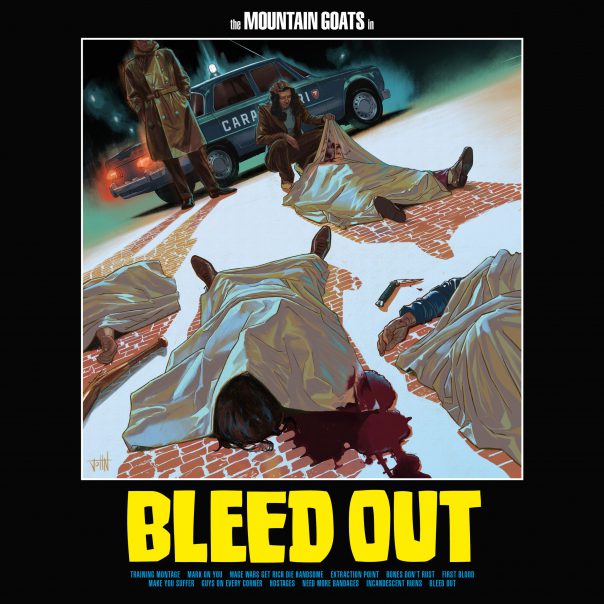REVIEW: The Mountain Goats explore action movies on ‘Bleed Out’

The Mountain Goats, “Bleed Out.”
There are two consistent things about The Mountain Goats: Only-member-turned-frontman John Darnielle and inconsistency. What started as a one-man lo-fi project recorded on a boombox has, over the course of 20 albums, touched on all sorts of subject matter and styles. From Goths (inspired by Bauhaus and The Cure) to Beat the Champ (inspired by pro wrestlers) to In League with Dragons inspired by Dungeons & Dragons, Darnielle and his rotating cast have been all over the place.
Bleed Out
The Mountain Goats
Merge, Aug. 19
8/10
The new album, Bleed Out, is inspired by old action movies from the ’60s through the ’80s. According to Darnielle, it was done in a very direct way. He would watch movies during lockdown and when he got an idea, he would pause, write it down, record the song on his trusty boombox, then go back to the movie. And that certainly comes through. More than his recent work, Bleed Out is upbeat, catchy, anthemic and very action-oriented. The result is fantastic.
The album kicks off with the accurately named “Training Montage,” which has the fantastic chorus that opens with Darnielle cheerfully shouting “I’m doing this for revenge!” It’s both a great tone-setter for the album and a really great song, the first of several that lodge themselves in your head.
“Mark on You” is a study in contrasts, with a very ’80s action guitar riff surrounding folk rock vocals and choruses. A lesser artist would make it sound disjointed, but somehow it works well. The last verse does get harder and describe the climactic scene in a revenge movie, which follows the previous song’s theme well.
What may be the album’s high point—and certainly the culmination of the theme—is “Wage Wars Get Rich Die Handsome.” The song features grungy distorted guitars and a ’90s alt-rock vibe that highlight a fantastically anthemic chorus that begs for a singalong at a show or in your car. While it doesn’t have the depth, nuance and complexity of Mountain Goats classics, it makes up for it in enthusiastic fun.
“Extraction Point”—the song titles really do beautifully encapsulate the pulp action movie vibe, because any of them could be the title of a direct-to-video Jean Claude Van Damme vehicle—brings it down a notch to the more standard folk vibe, though with a quicker pace than most. There’s also a horn-based hook that’s always welcome.
“Bones Don’t Rust” brings the album to the older end of the spectrum—’60s films. It could be the opening theme for some questionably grainy footage of excessive and poorly done blood effects. That the Mountain Goats can evoke such a specific feel as accurately as they have is impressive.
The song “First Blood” actually was pulled from the the title of the movie of the same name. The chorus includes the line “John Rambo never went to Vietnam,” though it also references Paul Kersey from Death Wish and others. And it obviously takes a bit of a contrarian view.
“Make You Suffer” is about promising to make you suffer. It’s not subtle! But it’s a chill, low-key, vaguely surf-rock-inspired song. The cognitive dissonance really adds to the enjoyment. This one doesn’t evoke any movie tropes, but if someone did make a movie with the same vibe, it would be fantastic.
Related stories:
If you like saxophones and funk-inspired guitar riffs, “Guys on Every Corner” is the song for you. The longest number on the album, the most thoughtful, and the one that’s most clearly a Mountain Goats song, is “Hostages.” It’s the story of a hostage situation, presumably from the perspective of the bad guys. “We may run out of bullets/ We’re never gonna run out of hostages,” John Darnielle sings. It’s dreamy and folky—calming and almost wistful—while being incredibly dark. Nobody does that combination like Darnielle.
“Need More Bandages” opens sounding more like an ’80s arcade game, though on guitar rather than series of 8-bit beeps. “Incandescent Ruins” has a country vibe despite being about, superficially, escaping captivity by androids.
The album winds down with title track “Bleed Out,” another long one and another self-explanatory folk song. Appropriately, the closer is about the tragic end of an action hero, though it strays a bit from the album’s themes by being fairly slow and minimally anthemic. In terms of sound, pace, even genre, Bleed Out is all over the place. No two back-to-back tracks resemble each other musically. But as a testament to the quality of the songwriting, the theme is strong enough to make the album feel cohesive.
Follow editor Daniel J. Willis and tweet column ideas to him at Twitter.com/BayAreaData.
